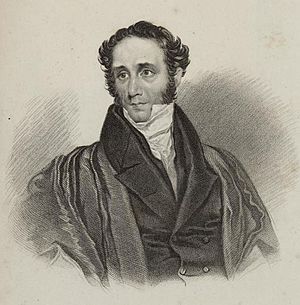John Hoppus facts for kids
John Hoppus (1789–1875) was an important English minister, writer, and reformer. He was a Fellow of the Royal Society, which is a very respected group of scientists. John Hoppus also worked to end slavery and improve education for everyone. He became the first professor of Logic and Philosophy of Mind at the new London University (now University College, London) in 1829. He held this job for many years, until 1866.
Contents
John Hoppus's Early Life and Education
John Hoppus grew up in England. He studied at a special school called Rotherham Independent College. This was a "dissenting academy," meaning it was for people who didn't follow the official Church of England.
He continued his studies at Edinburgh University and then at Glasgow University in Scotland. From 1824 to 1825, he worked as a pastor at the Carter Lane Chapel in Bermondsey.
Becoming a University Professor
When John Hoppus was young, England only had two universities: Oxford and Cambridge. These universities only accepted students who belonged to the Anglican Church. This meant many other people, called Dissenters, couldn't go there.
So, many private schools, or "academies," were created. These schools helped young men get ready for university studies in other countries, like Scotland.
Founding London University
In the early 1800s, some reformers wanted a new university in England. This university would be open to students of all religions and beliefs. This idea led to the founding of London University (now University College London) between 1825 and 1828. It was the first university in England that didn't belong to any specific religion.
The new university wanted to teach philosophy, which is the study of knowledge and ideas. They planned to have two professors for philosophy. One would teach about how we think and learn. The other would teach about right and wrong actions, and how society should work.
Challenges in Appointing Professors
Finding the right professors for these important jobs was tricky. Some traditional groups didn't like London University because it was so open-minded. They even started a rival college, King's College London.
The university leaders were careful not to upset anyone. They didn't want to choose professors who might cause problems or attract bad publicity.
John Hoppus was considered for one of the philosophy jobs. However, some people worried that choosing a minister like him would make the university seem religious, which went against its goal of being open to everyone.
John Hoppus Gets the Job
Despite these challenges, John Hoppus was eventually chosen. Some leaders on the university's Council believed that teaching ethics (right and wrong) should have a religious basis. This was important because some critics were calling the new university "ungodly."
So, in 1830, Dr. John Hoppus became the first Professor of Philosophy at London University. His official title was Professor of Logic and Mental Philosophy. He held this important position for over 30 years, retiring in 1866.
John Hoppus's Academic Achievements
John Hoppus was a very respected professor. His lectures at University College London were highly praised. He taught about many famous thinkers and their ideas, including René Descartes, John Locke, and Immanuel Kant.
Many of his students went on to become very successful. Some notable students include Walter Bagehot and Richard Holt Hutton.
Awards and Recognition
In recognition of his great teaching and knowledge, John Hoppus received an important degree (LL.D.) from Glasgow University in 1839. The next year, he became a member of the Royal Society, a very old and respected group of scientists. He was elected a Fellow (F.R.S.) in 1841.
Earlier in his career, in 1827, he wrote an important book about Francis Bacon's ideas on science and how to discover new knowledge. This was his first original work in philosophy.
John Hoppus's Political Work
Dr. Hoppus cared deeply about making education available to everyone. In 1847, he was a strong voice in the debate about creating a national education system in England.
Supporting Public Education
At the time, many poor children learned in "ragged schools," "charity schools," or "Sunday schools." These were volunteer groups. Dr. Hoppus believed the government should help provide education for all children. This idea was not popular with many people in his own religious group, who were suspicious of government control.
However, John Hoppus kept fighting for his beliefs. He famously said that "no child... be excluded from instruction through the parents' poverty." About 20 years later, his ideas won out. His efforts, along with others, led to the Elementary Education Act 1870. This law helped make sure more children could go to school.
Fighting Against Slavery
John Hoppus also worked hard to end slavery. In 1830, he led a meeting of Congregational ministers who passed a strong statement against slavery. They declared that slavery was "an extreme evil" that destroyed human life, social connections, and moral character. They believed it should be completely abolished.
Animal Welfare
Another cause John Hoppus supported was animal welfare. He was part of groups in the 1830s that worked to treat animals kindly.
Death and Memorial
Dr. John Hoppus passed away in 1875. He was buried at Abney Park Cemetery in Stoke Newington, north London. His memorial stone can still be seen there today.
 | Chris Smalls |
 | Fred Hampton |
 | Ralph Abernathy |


